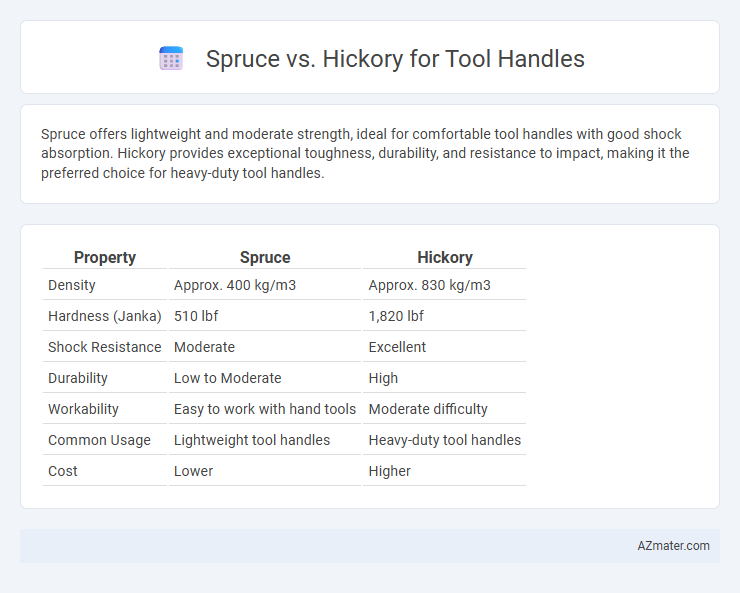Spruce offers lightweight and moderate strength, ideal for comfortable tool handles with good shock absorption. Hickory provides exceptional toughness, durability, and resistance to impact, making it the preferred choice for heavy-duty tool handles.
Table of Comparison
| Property | Spruce | Hickory |
|---|---|---|
| Density | Approx. 400 kg/m3 | Approx. 830 kg/m3 |
| Hardness (Janka) | 510 lbf | 1,820 lbf |
| Shock Resistance | Moderate | Excellent |
| Durability | Low to Moderate | High |
| Workability | Easy to work with hand tools | Moderate difficulty |
| Common Usage | Lightweight tool handles | Heavy-duty tool handles |
| Cost | Lower | Higher |
Introduction to Tool Handle Materials
Spruce offers a lightweight yet durable option for tool handles, valued for its shock absorption and ease of shaping. Hickory stands out with exceptional strength, density, and resistance to impact, making it a preferred choice for heavy-duty tool handles requiring longevity. Both woods provide distinct advantages, influencing their selection based on tool function and user preference in handle material performance.
Overview of Spruce Wood
Spruce wood is valued for tool handles due to its lightweight nature and straight grain, offering excellent shock absorption and ease of handling. Its moderate strength and elasticity make it suitable for tools requiring precise control without excessive weight. Spruce's fine texture and workability enhance comfort during extended use, distinguishing it from heavier, denser woods like hickory.
Overview of Hickory Wood
Hickory wood is renowned for its exceptional strength, shock resistance, and durability, making it a preferred choice for tool handles that require heavy-duty use and impact absorption. Its dense grain structure provides a firm grip and enhances longevity compared to softer woods like spruce. The natural flexibility of hickory minimizes handle breakage, ensuring reliable performance in demanding work environments.
Strength and Durability Comparison
Hickory offers superior strength and durability compared to spruce, making it the preferred choice for tool handles subject to heavy use and impact. While spruce is lighter and less dense, it lacks the toughness and shock resistance of hickory, which contains dense grain and high tensile strength. Hickory's ability to withstand repeated stress and resist splintering ensures longer lifespan and reliability in demanding work environments.
Flexibility and Shock Absorption
Spruce offers moderate flexibility and lightweight properties, making it suitable for tool handles requiring some give without excessive weight. Hickory provides superior shock absorption and exceptional strength, reducing user fatigue during repetitive tasks by effectively dampening vibrations. Choosing between spruce and hickory depends on the tool's application, with hickory preferred for heavy-duty use and spruce for lighter, flexible needs.
Weight and Balance Considerations
Spruce tool handles are lighter than hickory, offering reduced fatigue during extended use, making them ideal for precision tasks. Hickory, known for its superior density and shock absorption, provides better balance and durability, which enhances control and longevity in heavy-duty applications. Selecting between the two depends on prioritizing lightweight ease versus robust performance and stability in tool handling.
Workability and Shaping Ease
Spruce offers superior workability and shaping ease due to its softer grain and lower density, making it ideal for intricate handle designs and quick adjustments. Hickory, while harder and denser, provides greater durability but requires more effort and specialized tools for detailed shaping. Tool handles crafted from spruce are favored for ergonomic customization, whereas hickory is preferred when strength and impact resistance are critical.
Resistance to Moisture and Decay
Spruce offers moderate resistance to moisture and decay, but its softer grain makes it more susceptible to damage in humid environments compared to Hickory. Hickory is highly valued for tool handles due to its superior moisture resistance and natural decay-resistant properties, ensuring durability and longevity in outdoor or high-use conditions. Choosing Hickory results in handles that maintain strength and integrity even when exposed to moisture over extended periods.
Cost and Availability
Spruce tool handles typically cost less due to the wood's faster growth and wider availability, making it a budget-friendly option for many users. Hickory, prized for its superior strength and shock resistance, commands a higher price and may be less readily available in some regions. The readily accessible spruce ensures quick replacement and cost efficiency, while hickory's durability justifies its premium price despite potential scarcity.
Best Applications for Spruce and Hickory Handles
Spruce tool handles are ideal for light to medium-duty applications due to their lightweight nature and moderate strength, making them perfect for carpentry, woodworking, and gardening tools where ease of use and precision are essential. Hickory handles excel in heavy-duty tasks because of their exceptional shock resistance, toughness, and durability, commonly used in axes, hammers, and sledgehammers to absorb impact and reduce user fatigue. Selecting spruce handles benefits precision work requiring agility, while hickory handles provide unmatched performance in high-impact and heavy-wielding tools.

Infographic: Spruce vs Hickory for Tool Handle
 azmater.com
azmater.com